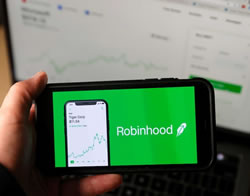Kevin T. Dugan* says Robinhood’s IPO filing has revealed a lot about that company that wasn’t previously known.
 Robinhood, the online broker behind this year’s great GameStop frenzy, is set to join the public markets — just months after nearly breaking them.
Robinhood, the online broker behind this year’s great GameStop frenzy, is set to join the public markets — just months after nearly breaking them.
The app’s parent company filed for an initial public offering Thursday, to sell shares on Nasdaq under the ticker HOOD.
The roughly 400-page S-1 regulatory filing — which has a hefty 73 pages of risk factors — disclosed for the first time that Robinhood has 18 million funded accounts, with $80.9 billion in customer assets.
It also revealed how reliant it is on companies like market maker Citadel Securities, which pays for its customer trading data.
Robinhood, founded in 2013 by Vladimir Tenev and Bhaiju Bhatt, is part of an emerging group of online trading services that also includes Betterment, Acorns, and Wealthfront.
Unlike many of its competitors, though, Robinhood attracted attention for encouraging customers to invest through its game-like interface — prompting scrutiny by regulators and Congress alike.
The app, known by its green quill logo, exploded in popularity last year after the COVID-19 pandemic caused people to stay home, spend less on incidentals, and rake in stimulus checks from the Federal Government.
It was the broker of choice for Reddit’s r/WallStreetBets, a message board forum that drove the trading frenzy behind struggling video game retailer GameStop, joke cryptocurrencies, and other so-called meme stocks.
Here’s what else we learned about the company based on its IPO filing on Thursday:
Robinhood is growing because of meme cryptocurrencies
Dogecoin started on a lark the same year that Robinhood was founded.
The digital currency, which uses a Shiba Inu dog from a popular meme at the time as a mascot, was supposed to be a commentary on the wild and weird world of Bitcoin knock-offs that were still largely unknown to the public.
Now, however, the total market cap of Dogecoin is $31.5 billion, thanks to rampant speculation, as well as the backing of business tycoons like Elon Musk and Mark Cuban.
Robinhood disclosed that 17 per cent of its total revenues last quarter, or roughly $88.8 million, came from selling data on crypto trading— with more than a third of that just coming from the canine-branded currency.
It’s one of the few individual assets that’s specifically detailed in the IPO offering documents, but it shows how dependent the app is on the kind of online trading frenzies that have roiled the markets this year.
Even Billy Markus, one of Dogecoin’s founders, quipped on Twitter, “Dogecoin is good at making businesses money.”
You are (81 per cent of) the product
Robinhood has been one of the most controversial trading apps ever since it was reported in 2018 that it made about half of its revenue by selling its trading data to much larger Wall Street firms, like Citadel, giving those behemoths an edge in market trading.
That practice, known as “payment for order flow,” has been criticized for allowing some traders to get a sneak peek into how markets could move.
Robinhood has previously settled with the Securities and Exchange Commission for not disclosing this to investors, though it didn’t admit wrongdoing.
It turns out that revenue from selling this trading data is an even bigger slice of the business than previously known — and it’s only been growing. Eighty-one per cent of its quarterly sales ending March 31 was from selling trading data, according to the regulatory filing.
That’s the highest percentage ever for the company — up from 60 per cent in the first quarter of 2019 — on the highest quarterly revenue of $522 million.
Knives are out
Regulators, Congress, and unhappy customers all haunt the risks section of Robinhood’s IPO filing, which makes clear that its business could very well be upended by new market rules or federal laws that could inhibit how it makes money.
Among the top issues spelled out are recent comments by S.E.C. Chairman Gary Gensler, who instructed the regulator to study the game-like aspects of online trading, payment for order flow, and the amount of cash brokers need to meet market demands, a problem that fuelled the meme stock surge.
In addition to that, as many as 1,600 Robinhood customers may file arbitration complaints over service outages.
There are also as many as 48 putative class-action lawsuits seeking damages after Robinhood restricted the trading of meme stocks.
Robinhood may have trouble raising money until 2023
In the relatively staid world of online retail brokerages, Robinhood has had its fair share of volatility.
Some of the risk factors the company points to are its multiple service outages, which has attracted potential class-action lawsuits, and the high costs demanded by Wall Street to clear trades of risky meme stocks.
The upshot is that the company can suffer technical glitches or its business can become too expensive to operate, and it may need to raise more money to survive.
The rub is that Robinhood may not be able to. As a result of the S.E.C. settlement, the company is considered an “ineligible issuer,” which inhibits its ability to raise capital, until Dec. 17, 2023.
According to the IPO filing, “we may be unable to react quickly to such changing requirements and conditions and could be delayed in our ability to raise additional capital.”
This could be a problem if Robinhood got caught up in a snafu like the now-defunct trading firm Knight Capital Group, which imploded in 2012 after losing $460 million due to trading errors.
*Kevin T. Dugan is a contributor at Fortune.
This article first appeared at fortune.com.











